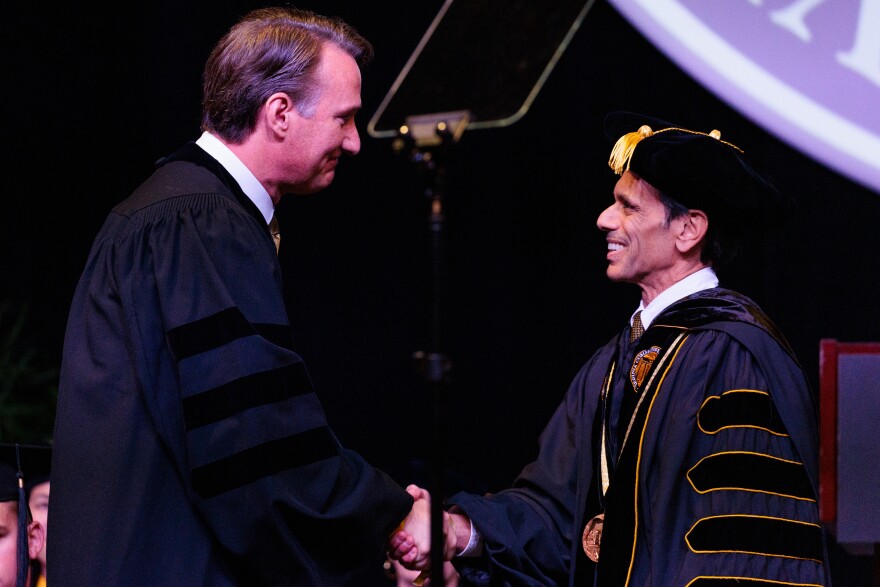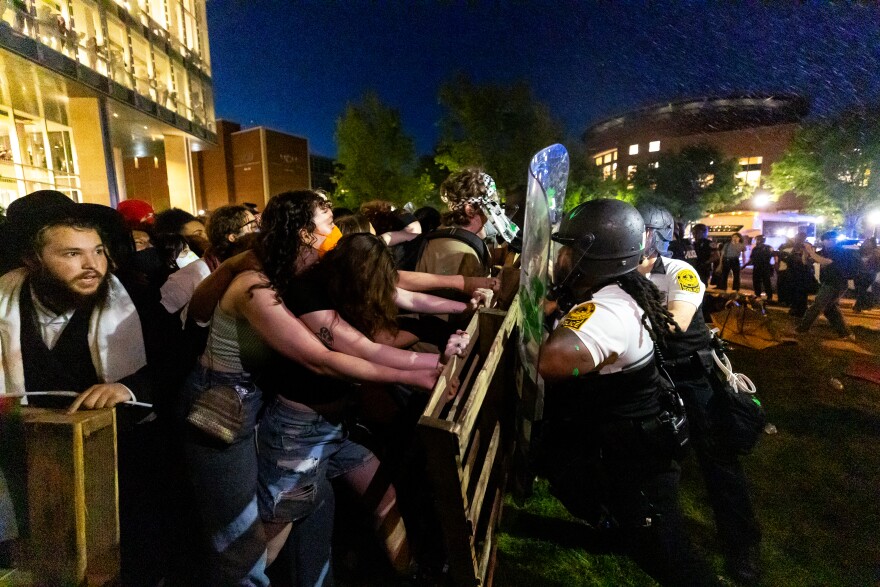As Virginia Commonwealth University’s 2024 commencement kicked off at the Greater Richmond Convention Center, the student singing the national anthem wore a keffiyeh, a traditional Arab headscarf that has become a symbol of solidarity with Palestinians.
Soon after, Gov. Glenn Youngkin, the commencement speaker, took the stage and dozens of students walked out to cheers from the audience. After exiting the building, they held up signs like “No graduation as usual” and “Unacceptable leadership,” while chanting and marching to nearby Abner Clay Park.
In interviews following the Saturday walkout, graduating VCU students said they were protesting Youngkin’s stance on race and gender issues as well as law enforcement’s use of force in breaking up student protests over the Israel–Hamas war and American support of the Israeli government.
Siatta Kaba, 24, was among the graduates who walked out, wearing a keffiyeh over their graduation gown. Kaba got emotional when thinking about completing their education, especially because they thought about dropping out after their mother died in a car crash during freshman year.
“I almost didn't think I was going to finish that semester. And so finishing,” Kaba said, then paused. “It means a lot to me.”
But being part of a movement to spur change made walking out worth it, according to Kaba; after hearing about the power of protest and civil disobedience in class, Kaba wanted to put their African American Studies degree into practice.
“African American studies is a discipline that arose out of protests during the civil rights era with the Black Panthers,” Kaba said. “The entire reason that I was able to get this degree was because of Black youth in colleges standing up and saying we’re not going to stand for this shit, we’re not going to allow you to oppress our rights.”

Arrington Evans, 22, was another VCU graduate who joined the walkout, forgoing crossing the stage though she had been denied that opportunity in high school due to the pandemic.
Evans also said leaving the ceremony was worth it.
“I've had enough celebration and commencement for this moment,” Evans said. “The history of different cultures, and different people — it matters to me, so it would be hypocritical for me to sit there and just listen to someone who does not agree.”
Governors are regular speakers at public university commencement ceremonies. Every governor for the past three decades has spoken at VCU, with the exception of former Gov. Ralph Northam, whose tenure overlapped with a political crisis and the pandemic. Youngkin has spoken to at least six graduating classes since taking office.
Last year, students walked out of his commencement speech at George Mason University; WUSA reported at the time that protesters "specifically called out his stance on how race and history are taught in schools and policies concerning transgender students.”
At VCU on Saturday — except for a few tense minutes while university personnel scurried about during the walkout — the two-hour ceremony had pockets of upbeat cheers as groups of graduating students walked across the stage to receive diplomas.
Youngkin’s comments focused on thanking mothers ahead of Sunday’s Mother’s Day holiday and the metaphor of a symphony.
“Ultimately it comes down to finding your passion, understanding pace and transitions, assembling your performers and leading with resilience,” Youngkin said.
Students who walked out would not be subject to disciplinary action from the university if they were not disruptive, a university spokesperson told VPM News.

Over 130 protesters have been arrested in Virginia on college campuses in recent weeks — including the University of Virginia, University of Mary Washington, Virginia Tech and VCU. Protesters in Richmond called for VCU to disclose and end financial ties with Israel and call for a ceasefire in the Israel–Hamas war.
Youngkin had said on CNN that encampments wouldn’t be allowed in Virginia, but didn’t acknowledge any primary role in the clearing of protesters using police in riot gear and chemical deterrents like pepper spray when speaking to reporters Tuesday. He said that Attorney General Jason Miyares advised state college presidents on the issue of student protests; VPM News has submitted a public records request to obtain a copy of the reported guidance.
The VCU walkout had been expected for weeks. Days before the ceremony when asked about it by reporters, Youngkin indicated it had no effect on his decision to speak; he instead used the opportunity to scold those who planned to participate.
“This is about celebrating hard work from VCU. Students who have dedicated so much time to a great day of achievement,” he said Tuesday. “I firmly believe it can be a great day of celebration. I think that anyone who thinks they're going to disrupt this for their own personal goals, I think, is misguided. Let's celebrate the students.”
The walkout also comes less than two weeks after school, local and state law enforcement in riot gear used pepper spray on students calling for VCU to sever ties with Israel. VCU students and staff have decried the response from VCUPD, Richmond Police Department and Virginia State Police that led to the arrests of six students, as well as the university’s decision to involve police. Some have also called for VCU President Michael Rao to resign.
“All of these protests across the nation — also globally — around Palestine is because of the people before us making these movements and giving us the power to feel like in the future, we can speak up,” Kaba said.
Kaba referenced student-led protests in the 1960s and 1970s calling for an end to the Vietnam war; there’ve been many parallels drawn between those and this wave of campus protests. A May 4, 1970, protest at Kent State University ended with the Ohio National Guard killing four students and wounding nine others.
Youngkin’s commencement speech did indirectly accuse protesters of being funded and supported by “outside entities,” without being specific, to disrupt and intimidate. Politicians supportive of Israel have repeatedly referred to the alleged outside funding of student-led pro-Palestine protests, typically focusing on two organizations: Students for Justice in Palestine and American Muslims for Palestine.
The Anti-Defamation League and Louis D. Brandeis Center for Human Rights Under Law — Jewish organizations that have been supportive of Israel — wrote 200 university presidents on Oct. 25 alleging that chapters of Students for Justice in Palestine have been financially supporting Hamas, which the group has said is “baseless” and part of an intimidation campaign A few days later, Attorney General Jason Miyares announced an investigation into another group, American Muslims for Palestine, on a similar allegation that it is violating state donation laws. That has not yet yielded any public findings.
Youngkin’s speech did not address race and gender policies or Palestine directly, but perhaps nodded toward a subtle admonishment: “You will dictate what you compose, I encourage you to see opportunities for addition and multiplication, not subtraction and division.”
While Youngkin’s remarks about college protests in support of Palestinians living in Gaza has attracted attention in recent weeks, VCU students initially objected to the March announcement that Youngkin would be speaking on the basis of his administration’s actions regarding race and gender.
Youngkin campaigned on conservative rhetoric regarding how schools taught race and accepted different gender identities. Shortly after taking office, he issued executive orders aimed at critical race theory he alleged was being taught in Virginia’s K-12 schools.
His administration later faced backlash over inaccurate draft history standards, and it also recently inserted itself into the discussion about how VCU teaches about race.
Evans walked out of her VCU graduation because of all these issues.
“Recognizing the history of human rights — and getting to a point where everybody is equal — that matters,” Evans said. “Human rights are not political. Our education should not be political.”
In March, VCU Provost Fotis Sotiropoulos sent draft racial literacy curriculum materials to Education Secretary Aimee Guidera at the Youngkin administration’s request. Christian Martinez, a spokesperson for the governor, previously told VPM News that “the Administration has heard concerns from members of the Board of Visitors, parents, and students across the Commonwealth regarding core curriculum mandates that are a thinly veiled attempt to incorporate the progressive left’s groupthink on Virginia’s students.”
Late Friday, to the dismay of many students who spoke with VPM News, VCU’s Board of Visitors voted not to mandate a racial literacy course requirement at the university that’d been in the works for years. While several members were appointed by Youngkin, Northam appointees still maintain a majority on the board.
VCU student Micah White said Saturday that the racial literacy requirement was especially important given the VCU Medical Center’s history of robbing African American graves for medical experiments and transplanting the organs of Black patients without consent.
“We need to do something to rectify that mark, that scar that's been done to the RVA community,” White said.
Separately, Youngkin’s Department of Education issued guidance on transgender students last summer that students feared would lead to them being outed. Those policies have been formally adopted by several school boards — including Hanover and Spotsylvania counties, as well as Virginia Beach — while they are also being challenged by the ACLU in court.
VCU graduate Payton Van Winkle walked out Saturday because of Youngkin’s policies regarding trans youth.
“I just can't sit by at an academic institution that invited someone in power who wants to act in such a way that is so against the safety of trans youth in schools,” Van Winkle said.
The recent Virginia campus protests echo calls nationwide for both divestment from financial ties to Israel and a permanent ceasefire in the Israel-Hamas war.
During the Oct. 7 attacks, Hamas killed roughly 1,100 Israelis and abducted about 250 people; approximately 9,000 Israelis have been injured from Oct. 7 through May 10, the most recent count available.
Roughly half of the hostages remain unaccounted for.
The number of Palestinians killed and injured in Gaza is contested: The health ministry there says close to 35,000 have died and more than 78,000 have been injured, but may be an undercount amid the health care and emergency response systems’ destruction.
Multiple countries and a United Nations body have suggested Israel’s actions in Gaza since Oct. 7 constitute genocide. South Africa filed a case at the International Court of Justice, accusing the country of genocide, in late 2023. The court ordered Israel to take steps to prevent genocide, but has not ruled the country's actions can be called genocide. The Israeli government has rejected the accusations. On Friday, President Joe Biden’s administration said that Israel’s use of U.S.-supplied weapons likely violated humanitarian law.









